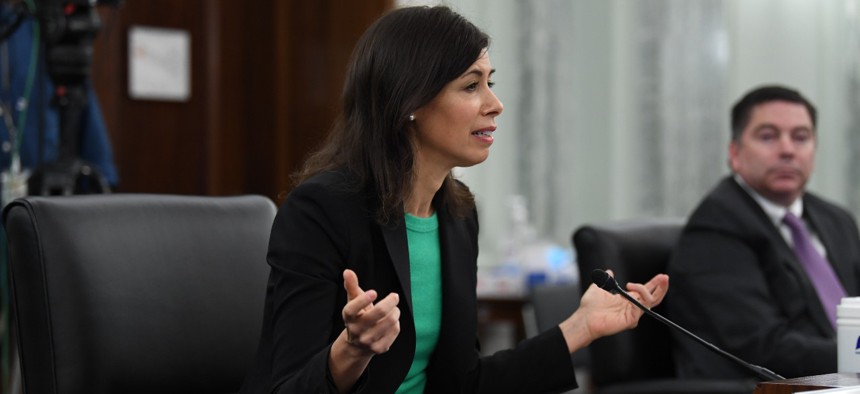More than 17M low-income households will experience service disruptions if internet subsidy ends

"For the overwhelming majority of ACP recipients, the monthly subsidy is not a luxury, it’s a necessity,” said FCC Chairwoman Jessica Rosenworcel. Jonathan Newton-Pool via Getty Images
Without the the Affordable Connectivity program, millions of families could lose internet access that they rely on for work, school and health care, new survey data shows.
The Federal Communications Commission on Thursday warned that as many as three-quarters, or more than 17 million, of the 23 million households who participate in the Affordable Connectivity Program could see disruptions to their internet access should the program end.
Funding for the ACP, which provides a $30-a-month subsidy to eligible low-income households for internet access, is set to run out at the end of April unless Congress provides more money to continue it.
The FCC, which surveyed ACP households in December, also found that more than two-thirds of respondents had inconsistent or zero connectivity prior to enrolling in the program. Of that group, 80% cited affordability as the reason.
The program's future remains uncertain, even after congressional leaders announced Wednesday that they had reached a deal on six of the 12 must-pass spending bills for the fiscal year that began in October.
The FCC released the survey data on the same day the House and the Senate approved a fourth short-term spending bill. It will run through next Friday, March 8, averting a government shutdown and giving Congress time to pass the six appropriations bills they have agreed on. But the ACP’s fate won’t be decided until March 22, which is the deadline lawmakers gave themselves to pass the final six spending bills, which includes funding for the FCC.
Pushing back a decision on ACP’s future means that the FCC will have to continue turning away those seeking to sign up. Because of the uncertainty over the funding, the agency stopped accepting new applicants on Feb. 8.
While the exact number of households being turned away is unknown, an average of 586,738 households a month and about 11,720 households per state have been signing up for the program over the past year.
The survey shows that “for the overwhelming majority of ACP recipients, the monthly subsidy is not a luxury, it’s a necessity,” FCC Chairwoman Jessica Rosenworcel said in a statement.
Survey data additionally found that 47% of respondents, and 53% living in rural areas, reported either having no internet service or relying on their cellphones prior to joining the ACP.
About 72% of program participants said they use the internet to schedule or attend health care appointments, 48% use it to complete work or apply for jobs, and 75% between the ages of 18 and 24 use it to do schoolwork.
Preserving the program has been a top priority for state and local officials, including the National Association of Counties who lobbied members to approve the funding during their annual gathering in Washington, D.C., in mid-February.
The issue was also highlighted by NACo President and Ramsey County, Minnesota, Commissioner Mary Jo McGuire during a meeting between the association’s leaders and Route Fifty.
“In a lot of families, mom and pop are both working. They may have three jobs between them just to put food on the table and keep the roof over their head. They can't afford a cable bill,” she said. “Their children still need that to be able to be competitive at school. They don't have a way to connect, so they're staying at school later or they're at the libraries. Being able to subsidize that cable service to the home so that children can study in their own homes and be able to function well is a necessary piece.”
Kery Murakami is a senior reporter for Route Fifty, covering Congress and federal policy. He can be reached at kmurakami@govexec.com. Follow @Kery_Murakami

NEXT STORY: A transparent, open-source vision for U.S. elections






